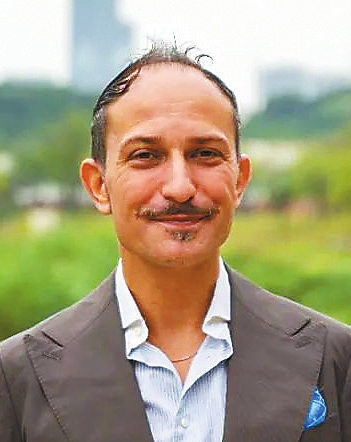

Chen Xiaochun 654789759@qq.com LURED by Shenzhen’s incredible biodiversity, Italian ecosystem scientist and engineer Matteo Convertino came and settled in the city some three months ago after he got the opportunity to work on ecology and environment through an engineering angle. Currently an associate professor at the Institute of Environment & Ecology of Tsinghua Shenzhen International Graduate School, Convertino is passionate about biodiversity and how biodiversity dynamically evolves over space and time across water-dominated ecosystems, including rivers, lakes, wetlands and the ocean. “Shenzhen is actually the northern tip of what is called the blue carbon lung, which is mostly famous for the Coral Triangle, the largest blue carbon sequestration area in the whole world. Together with another green carbon area, the Amazon rainforest, these two dipoles are actually extremely important for the whole climate regulation,” Convertino told Shenzhen Daily. He said that Shenzhen is an incredible place of biodiversity. “There are many unique species and unique ecosystems here. The development that happens so quickly here poses a lot of challenges as well as opportunities. That’s why I was attracted to come here.” One place that particularly intrigues him is Shenzhen Bay, which is also one of his focuses. “There are a lot of blue carbon habitats there, for example, mangroves, which are really important for biodiversity and carbon sequestration. Shenzhen Bay actually brings together Hong Kong and Shenzhen, ecologically speaking, and the mangrove communities of both sides are really converging with each other, which is really fascinating to me,” he said. For him, Shenzhen Bay is a unique area because it has the highest number of certain migratory bird species among all bird hotspots in South China and Southeast Asia. “For example, there is one bird called the black-faced spoonbill, and at least one quarter of its population in the whole of Asia is over there [Shenzhen Bay] during our winter,” he said. Convertino’s main goal is to understand the interconnections between species, climate and habitats, “because we can actually engineer the ecology through very precise ecological interventions on habitats at the macro and micro scale.” In October 2021, Convertino launched the Dasha River Ecological Survey in which he invited citizens to join him in the research of fish collective behavior to predict the river’s macro-level biodiversity and environmental quality. The fish observation project is just the start of the ecosystem scientist’s bigger goals. He wishes to involve all biodiversity lovers, who are passionate about birds, plants, fish, insects and other species in Shenzhen, and worldwide, to record their observations into a common database, which is crucial to assess ecosystem health and plan connected ecosystem restoration projects supported by computational models and partnerships with stakeholders. “It’s important to monitor the environment such as water quantity and quality, but we also must understand how the ecological communities are changing whenever we change our environment either because of development or other factors. So, I wish to create this database with public information such as images and videos, possibly with GPS information and maybe other features that we scientists as well as public policymakers can use to improve our future habitats,” Convertino said. Though he has only been in Shenzhen for a few months, Convertino actually visited China for the first time some 12 years ago and has personally experienced the country’s tremendous changes over the past decade. According to Convertino, China today is more open than ever, providing many opportunities for expats to work and live here with its rich resources. “Since I came here, I have had a lot of opportunities in terms of research and partnership with the industry and the government to try to do something that makes our ecosystems better. The amount of connections that I had here in such a short time is incredibly high. I am really happy to work here,” Convertino told Shenzhen Daily. | 
